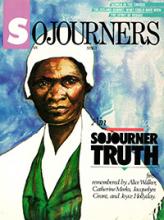Regular readers of Sojourners may recall that last year in our July issue we published an article called "God's Gift of Sexuality" by the Quaker theologian Richard J. Foster. The article attempted a brief survey of biblical teaching on sexuality and tried to put forward an affirmative Christian approach that avoided the twin evils of repression and permissiveness. In the course of that discussion, Foster included a section on homosexuality which quickly became one of the most controversial items we have ever published.
Regular readers may also remember that for two months last fall our "Postmark" section was dominated by a sampling of reader response, mostly negative, to that portion of Foster's article. Many found Foster's approach to the subject outdated, overly legalistic, or lacking in compassion. Other letters, albeit fewer in number, expressed appreciation for Foster's willingness to challenge some prevailing liberal assumptions from a biblical perspective.
What even the most careful of our readers may not know is the extent to which all those feelings and responses were also present among our magazine staff and within the circle of Sojourners Community, though in different proportions. The decision was made to publish the article, including the portion on homosexuality, because it was consistent with the approach to sexuality taken by Sojourners Community since its beginning.
Read the Full Article

